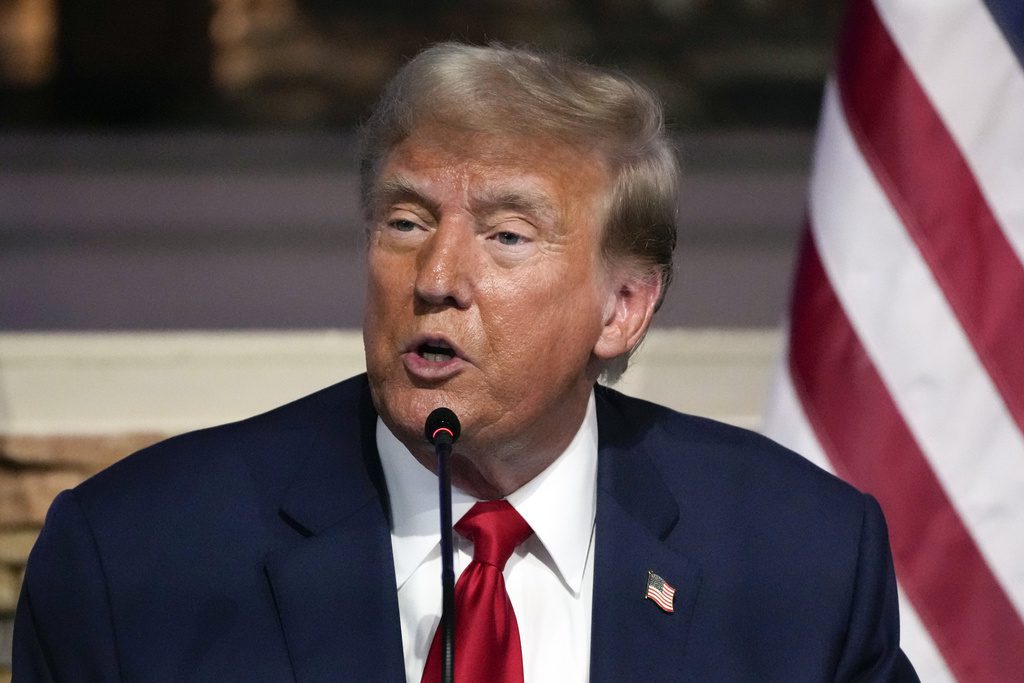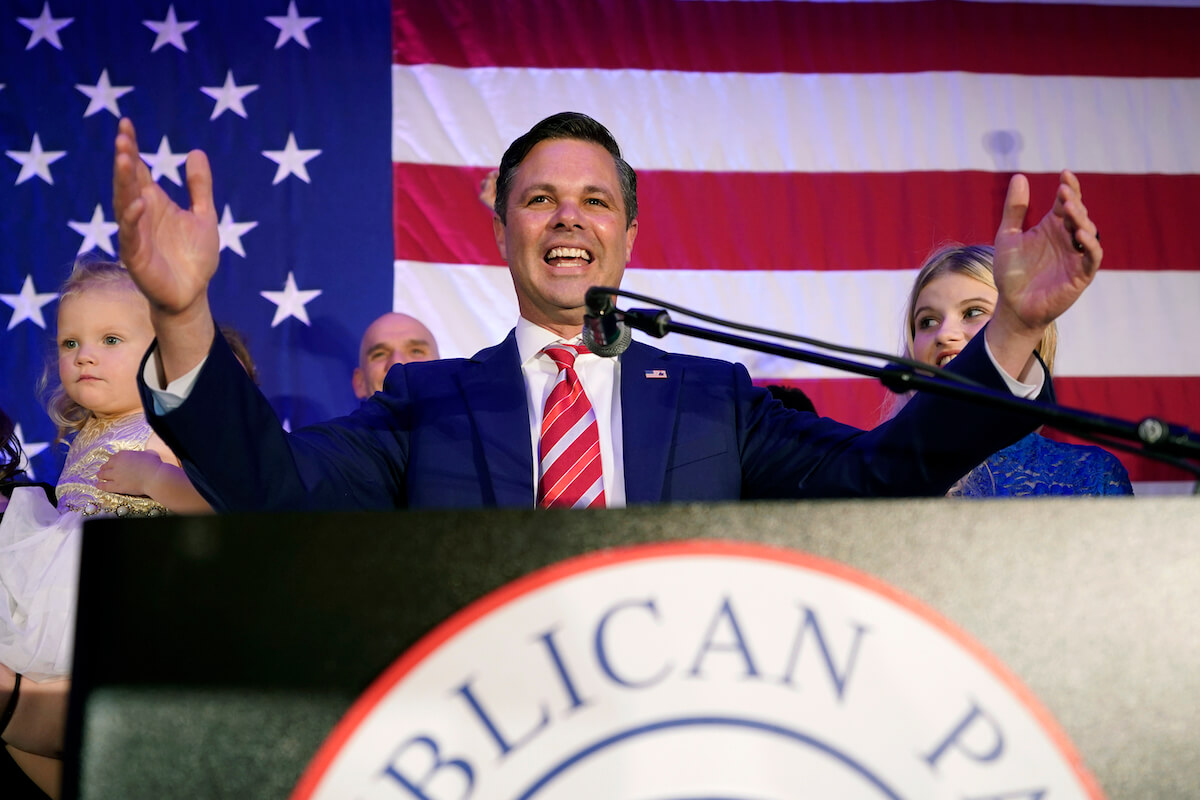
Republican presidential candidate former President Donald Trump speaks at a campaign event at 180 Church, Saturday, June 15, 2024, in Detroit. (AP Photo/Carlos Osorio)
The former president has cozied up to fellow billionaires in recent months as he’s become increasingly anxious to avoid prison, and therefore needs cash to fund his legal and campaign fees. In exchange, he’s promising to once again pass tax cuts for corporations and the super rich.
When former president Donald Trump entered the political realm nearly a decade ago, he pitched himself to voters as an anti-special-interest, “drain the swamp” candidate who would fight for the everyman.
During his presidency, however, Trump appointed many cabinet members from that same “swamp,” and passed only one major piece of legislation: a massive tax cut for corporations and the ultra-wealthy.
Now, as he runs for another term in the White House in 2024, Trump is openly cozying up to billionaires and promising them yet another massive tax cut worth billions of dollars—in some cases as part of a plea for campaign donations.
Trump’s billionaire backers
Trump’s friendliness with fellow billionaires is no secret. There are dozens of billionaires supporting his campaign, including Home Depot co-founder Bernie Marcus, Continental Resources founder Harold Hamm, Texas oil businessman Timothy Dunn, Los Angeles real estate magnate Geoffrey Palmer, and Blackstone CEO and co-founder Steve Schwarzman. Others, like Citadel hedge fund founder Ken Griffin, have made positive remarks about Trump but have stopped short of expressly supporting his campaign.
As his legal troubles have mounted and his campaign has spent tens of millions of dollars on his legal fees, Trump has thrown all pretense out the window and promised some of his super wealthy backers that he will push whatever agenda they want in exchange for campaign donations.
In April, Trump asked oil industry executives to donate $1 billion to his reelection campaign at a dinner meeting at his home in Palm Beach, Fla. In exchange, he vowed to reverse dozens of President Biden’s environmental policies should he be elected in November and to stop future ones from being enacted, effectively saving them billions due to tax cuts and avoided regulations.
These oil industry executives reportedly have a long list of policy actions they would want the former president to take if he returns to the White House, according to POLITICO. These actions include rolling back pollution regulations that damage their bottom lines, as well as dismantling certain parts of Biden’s green agenda.
At another event with oil executives in Houston in May, the former president promised them he would immediately approve their projects and expand oil drilling during a second term—just as he did when he expedited the controversial Dakota Access and Keystone XL pipelines after taking office in 2017.
Trump also met with wealthy donors at a New York hotel last month, where he told them that he had rejected a potential lunch with a $1 million contributor.
“I’m not having lunch,” Trump told them he responded, according to donors who attended the event and spoke with The Washington Post. “You’ve got to make it $25 million.”
At that same event, Trump explained to attendees that it was in their best interest to invest in his campaign because President Biden has vowed to let Trump-era tax cuts on the wealthy and corporations expire at the end of 2025.
Just last week, the former president met with 80 CEOs in Washington and promised them that they’ll see tax cuts and a decrease of business regulations should he be elected in November. Specifically, Trump said he plans to bring the federal corporate tax rate down from 21% to 20%, cut income tax rates, and bring back the same economic policies he enacted during his first term.
“We’re going to give you more of the same for the next four years,” a person who was in the room said, describing Trump’s message to attendees.
All in all, the former president has met with an assortment of legal, finance, oil, real estate, and other business executives in recent months, according to people who are familiar with the invitation lists for these events; they’ve met at his Mar-a-Lago Club in Palm Beach, Fla., and his New York City apartment. As The Washington Post reported, Trump has often promised to accomplish certain agenda items in exchange for monetary campaign support, according to people close to the former president.
As The New Republic notes, “Trump is selling his administration’s domestic and foreign policy to the highest bidder.”
“Trump is indeed compromised in a way he never has been before,” The New Republic goes on. “He’s desperate to avoid prison, and he needs cash to win reelection so he can pardon himself.”
Trump’s tax cuts for the wealthy
In promising to extend his 2017 tax cuts, Trump is doubling down on a policy that overwhelmingly benefited the wealthy.
They gave a roughly $49,000 tax cut to the top 1%, and only $500 to those in the bottom 60%. And in 2018, the richest 400 families in the United States paid an average effective tax rate of 23%, while the bottom half of American households paid a rate of 24.2%, according to calculations from University of California at Berkeley economists Emmanuel Saez and Gabriel Zucman.
Overall, Trump’s tax package gave the top 0.1% of US households a 2.5% tax cut, which pushed their rate below that of the lower 50% of US earners.
Trump’s tax law also gives companies a 50% tax break on their foreign profits and allows companies to be tax exempt from a 10% return on tangible investments that are made outside the US, making it financially advantageous for them to move jobs overseas.
A study from the Committee for a Responsible Federal Budget (CRFB), a Washington think tank, found that Trump’s tax cuts added $1.9 trillion to the national debt over the 10-year budget window.
His new proposals would be more of the same, prioritizing the financial interests of corporations and the uber rich. A Tax Policy Center analysis also estimated that the extension would deliver an average tax cut of $175,710 to the richest 0.1%.
Extending his 2017 tax cuts and lowering the corporate tax rate would also add an estimated $4.7 trillion to the national deficit over the next 10 years, according to an analysis by researchers at Stanford University and MIT.
The nonpartisan Congressional Budget Office came to a similar conclusion, finding that extending Trump’s tax cuts would add $4.6 trillion to the national debt over the next decade.
Trump also floated the idea of eliminating the income tax and replacing it only with tariffs (taxes on imported goods), a proposal that would cause prices to surge and could cost the average American family $5,000 per year, according to an economist from the Center for American Progress Action Fund.
Other economists and policy makers have also sounded the alarm about such a plan, warning it would devastate middle- and working-class families. Adam Hersh, a senior economist with Economic Policy Institute Action, compared the tariff idea “to dropping a nuclear bomb on a hurricane” in terms of the destruction it would cause in the economy.
The Biden administration has also railed against Trump’s tax proposals.
“The fundamental economic policy choice that lies ahead is whether to return to the Republicans’ failed trickle-down approach or forge ahead with the president’s proven plan to grow the economy from the middle out and bottom up,” Lael Brainard, Biden’s national economic adviser, said in a speech at the Brookings Institution last month. “Do we want a tax system that favors the middle class or the wealthy? The expiration of Trump’s 2017 tax package next year will put tax fairness front and center.”
How the nation’s tax policy shakes out—and whether billionaires and corporations will continue to benefit from it—hinges on the outcome of the November election, and potentially just how many CEOs and billionaires Trump convinces to fund his campaign and contribute to his legal fees.
“So give me some of your money,” Trump said at a recent fundraiser hosted by Harold Hamm, the oil executive. “I’m begging for your money.”
Correction: A previous version of this story misstated the nature of Ken Griffin’s remarks about Donald Trump. It has been updated to more accurately reflect Griffin’s stance.

5 ways Trump’s ‘Big Beautiful Bill’ would change life in Iowa
What happens when a 940-page law tries to reshape America? Let's see how it would play out in the Hawkeye State. Iowa’s Republican Congressional...

Ottumwa Job Corps program, training 240 at-risk youth, faces Trump axe
Despite its success, Ottumwa Job Corps is among the 99 programs the Trump Administration is shutting down. The closure eliminates over 100 jobs in...

Iowa to deliver SNAP recipient data to the federal government
Iowa will comply with a federal order to give Social Security numbers and other data to the federal government without resistance. Privacy advocates...

Pete Buttigieg heads to Iowa for May town hall
A progressive veterans group will host Pete Buttigieg for a Cedar Rapids town hall this month to discuss the impact the Trump administration’s...

VoteVets targets Rep. Zach Nunn on Veterans Affairs cuts
A veterans voter education group is going after US. Rep. Zach Nunn in a new campaign over the Trump administration’s sweeping cuts to the US...

Iowa farms pay the price for Trump-Musk USDA cuts
Federal cuts are coming home to roost on Iowa farms. More than $11 million in funding that the USDA promised to Iowa's local food system spoiled...




